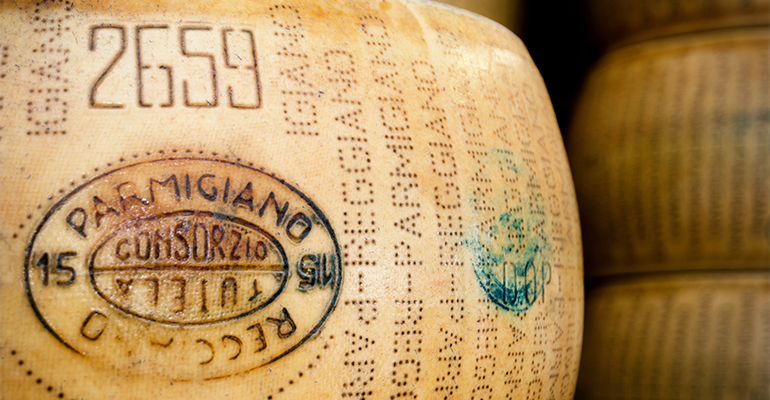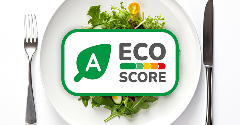News
Parmesan partnership to put ‘blockchain ready’ digital chip on all cheese wheels
29 Jun 2022
A new line of food-safe and secure digital labels on each Parmigiano Reggiano cheese wheel will deliver previously unseen levels of traceability, product control, and quality assurance, says the Consorzio del Parmigiano Reggiano (CFPR).
The new partnership sees CFPR team up with leading producer of casein cheese marks Kaasmerk Matec (Kaasmerk) and micro transponder digital tracing technology specialists p-Chip Corporation (p-Chip), to create a small digital device integrated into casein labels: an industry-standard, protein-based type of cheese identification method that has been applied to all Parmigiano Reggiano cheese wheels since 2002.

"Parmigiano Reggiano is one of the world's oldest and most famous cheeses, and it is a product that symbolizes Italian produce," said Nicola Bertinelli, president of the CFPR. "Since the establishment of our Consortium in 1934, we have worked to convey the value of our product globally and distinguish it from similar-sounding products on the market that do not meet our strict requirements for production and area of origin.”
“By being the first to incorporate these secure digital labels onto our cheese wheels, we can continue to ensure consumer safety, bringing the traceability and the authentication of our products to meet industry 4.0 technological targets."
A new secure digital tracking chip
A CFPR spokesperson told Ingredients Network that the use of a micro-transponder chip has much more potential than the current system (which utilizes a data-matrix code) and will allow Parmigiano Reggiano producers to implement and improve traceability systems.
“Once it is read, the chip is activated and records all data precisely and securely, sending them to the cloud,” said the CFPR, adding that the system is “blockchain-ready” and allows much more information to be uploaded and tracked than the previous system did.
The p-Chip micro-transponder is smaller than a grain of salt and can withstand multiple stages of processing and seasoning, meaning producers can track and control inventory, provide product authentication, perform quality assurance testing, and track multiple other aspects of product serialization and consumer safety, said the CFPR.
Track-and-trace tech protects in event of recalls
Each chip provides a digital label with a unique identification code. The systems uses encryption technologies that mean the chips cannot be read by other systems and cannot be copied in the way that a casein label can be, therefore providing a greater guarantee for quality and authentication, the consortium added.
"We're pleased to partner with a leading global brand as Consorzio del Parmigiano Reggiano is, to bring world-class, disruptive tracing technology to the food industry," said Joe Wagner, CEO of p-Chip Corporation.
"By integrating p-Chip micro transponders into casein tags, CFPR can better control its inventory, protect and differentiate its products against look and sound-alike brands and have access to unmatchable track-and-trace technology to protect itself in the case of recalls or other issues.”
Testing to continue before 2022 rollout
Over the past two years, the CFPR conducted extensive testing of the new digitally-integrated casein label and approved the label's technical use for the authentication and digital traceability of Parmigiano Reggiano cheese.
Next, in the final phase of testing, the new digital food labels will be added to 100,000 CFPR bulk cheese wheels in the second quarter of 2022.
“In this test phase, 100,000 plates with the chip will be applied to as many Parmigiano Reggiano wheels. At the end of the test, appropriate evaluations will be made to assess the application to the entire production,” the CFPR told us.
Low-cost traceability technology
The consortium added that while the costs for the project is not yet finalised, the digital tracking chip has a very low cost.
“Considering the number of moulds produced in a year (4,000,000), it would cost very little compared to the current cost of casein plate,” said CFPR. “Certainly, this cost will not be borne by the consumer.”
“At this stage, the application of the chip to the portions that go to the consumer is not foreseen,” it added.
“But thanks to this technology, the traceability of the individual wheel can be implemented so that those who process the whole wheels to portion them can, by reading the chip, acquire all the information related to the wheel itself, which could then be reported on the packaging for the final consumer.”
Related news

UK Government overhauls childhood obesity strategy
21 Nov 2025
The UK Government has announced a new package of measures designed to reverse the nation’s childhood obesity epidemic following the release of statistics revealing the scale of the crisis.
Read more
How younger consumers are redefining ingredient choices and rejecting brand loyalty
18 Nov 2025
Gen Z and millennial consumers’ preferences for transparency, functionality, and purpose are “redefining the very nature of consumption itself”, says SPINS.
Read more
New UPF standard hoped to offer consumers ‘coherence and clarity’
10 Nov 2025
Ingredients companies are being urged to enter “a new era of partnership and innovation” following the launch of the industry’s first non-UPF verification scheme.
Read more
Ingredient quantities mislabelled on popular protein bars, independent tests show
5 Nov 2025
Some popular protein bars contain more fat, carbs, and/or sugars than claimed on their labels, independent nutrition testing reveals.
Read more
Does promoting protein content push up plant-based sales?
27 Oct 2025
Promoting the protein content of meat-free products is a more effective sales strategy than adding carbon labels, a study of UK bakery chain Greggs suggests.
Read more
Supplement shoppers seek storytelling and science-backed suppliers
17 Oct 2025
Supplement consumers want specific health benefits that focus on prevention and personalisation, according to data from HealthFocus International.
Read more
Food fraud risks rise as brands fight economic and environmental headwinds
10 Oct 2025
Climate change, geopolitics, regulations, and demand for sustainable products are pushing up food fraud and adulteration risks, warns a world-leading food fraud expert.
Read more
The growing appeal of nutrient-dense food claims
2 Oct 2025
Nutrient-dense claims are rising as consumers reject the “empty calories” of UPFs in favour of products that provide meaningful nutrition with every calorie, Mintel data shows.
Read more
What does MAHA mean for the US nutraceutical industry?
30 Sep 2025
Industry associations have expressed mixed reactions to new policy directions on health and nutrition under the Make America Health Again (MAHA) banner.
Read more
Eco-Score labels improve consumer identification of sustainable foods
22 Sep 2025
The presence of a front-of-pack Eco-Score label improves consumers' accuracy in identifying sustainable food products from 52% to 72%, a study suggests.
Read more